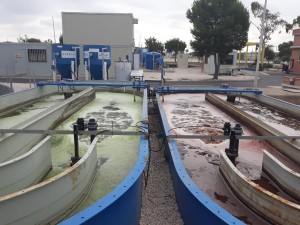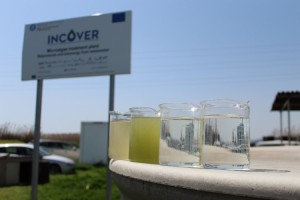Considering the current global pressures on available water resources and the high costs of the operation and maintenance (O&M) of wastewater treatment, the INCOVER project (Innovative Eco-Technologies for Resource Recovery from Wastewater) has been designed to move wastewater treatment from being primarily a sanitation technology to a resource recovery industry.
The project is developing innovative wastewater treatment technologies to recover energy, nutrients, water for irrigation and added-value bio-products such as PHA (bio-plastics), citric acid, biofertiliser, biochar and activated carbon.
The technologies have already been tested individually at lab scale and within the INCOVER project, they are combined at demonstration scale to treat agricultural, municipal and industrial wastewater. The combination of the technologies aim to reduce, by at least a 50%, the O&M costs of conventional wastewater treatment through the use of wastewater as a source for energy and added-value production and reduce GHG emissions by up to 80%. This aligns closely with the EU’s circular economy strategy.
During the first half of the project, INCOVER technologies were implemented through three cases studies at three demonstration sites – two located in Spain (Viladecans and Chiclana- Almeria) and one in Germany (Leipzig).
Anaerobic co-digestion unit with sewage sludge to produce biogas

In Viladecans, PHA (bio-plastics) is produced through photo-bioreactors (PBR) in which microalgae and cyanobacteria communities grow in a symbiotic relationship, removing pollutants from urban and agricultural wastewater and accumulating PHA. In Chiclana, PHA production is through High Rate Algae Pond (HRAP) using purple bacteria. The objective is to reach a production of 3,5 kg PHA/day.
At both spanish sites, the biomass produced is then treated in an anaerobic co-digestion unit with sewage sludge or other biomass as co-substrate, to produce biogas (150L/day). An innovative biogas upgrading technology, based on the symbiosis between microalgae and bacteria and the photosynthetic fixation of CO2, simultaneously removes CO2 and H2S to produce biomethane. This low-cost technology produces a biomethane concentration of 92%, and this high quality biomethane could be injected into natural gas grids or used as a biofuel.
Nature-based solutions such as constructed wetlands, Sludge Treatment Wetlands (STW) and evaporative systems have been constructed and are currently being optimised to treat raw wastewater, dewater and stabilise the sludge from anaerobic processes. These low-cost technologies allow to produce biofertiliser.
To improve recovery of phosphorus (P) and nitrogen (N), adsorption columns filled with innovative adsorbent materials (sol-gel coatings) and planted filters are optimised to recover nutrients. Recent lab tests show an adsorption capacity of 23-24 mg P/g material. Nutrient release tests from the material for agriculture are currently taking place.
Solar energy driven disinfection systems (ultrafiltration in Viladecans and electrochlorination in Almeria) are used to ensure the safe reuse of water for irrigation (sunflowers or grass fields). A Smart Irrigation System has been deployed on each field to ensure energy and water efficiency. A set of sensors/actuators (such as humidity sensors, water valves, etc.) and communication devices (nodes, gateways) allow real-time water needs to be determined to provide precise irrigation. The system can be remotely monitored and controlled with web-based application.
Yeast-based technology to extract citric acid from organic residues
In Leipzig, industrial wastewater from the food sector is treated to produce organic acid through yeast-based biotechnology. Citric acid is mainly used in detergents and cleaning products. The production of citric acid from oily wastewater offers a sustainable and cost-effective alternative to the production from petroleum-based feedstock.

After extracting citric acid, the residue is used for biogas production. The excess anaerobic sludge (from September 2018 onwards) will then be treated through the hydrothermal carbonisation (HTC) process. HTC allows biomass to be converted into valuable carbonised products such as biochar (used for domestic heating or as fertiliser) and carbon black (used as a reinforcing agent in tyres). To control and optimise all these bioprocesses, optical sensors based on multi-wavelength photo detectors and smart soft sensors are being developed.
The INCOVER technologies are evaluated according to their environmental, social and economic performances and the results are progressively integrated into a Decision Support System tool.
This tool will provide assistance to water authorities at choosing their optimal investments, to meet their needs. In the second half of the project, efforts will focus on optimising all the processes. Exploitation and marketing strategies will be intensified to prepare INCOVER technologies for market uptake.
About INCOVER project
INCOVER project combines the expertise of 18 European partners from seven countries. The consortium is coordinated by AIMEN Technology Centre (Spain) and includes: FINT – Future Intelligence (Greece), RECIRKU (Germany), SIMBIENTE (Portugal), SSP – SolarSpring (Germany), AUTARCON (Germany), IBET (Portugal), RENERGIE (Germany), BIOTREND (Portugal), AQUALIA (Spain), Aarhus University (Denmark), Universitat Politecnica de Catalunya (Spain), UFZ – The Helmholtz Centre for Environmental Research (Germany), Universidad de Valladolid (Spain), DTI (Denmark), OIEau (France), ISLE Utilities (UK) and ICLEI ES (Germany).
In May 2018, INCOVER was awarded the ‘Sludge and Resource Recovery Initiative of the Year’ at the annual Water Industry Award organized by WET News and Water & Wastewater Treatment.
To find out more about INCOVER project, visit project website and follow on LinkedIn, Twitter and Youtube.

INCOVER is a three-year project from June 2016 to May 2019. It has received funding (€7.2M) from the European Union’s Horizon 2020 research and innovation programme, under grant agreement No. 689242.
Text provided by Camille Madec (OIEau), in collaboration with the consortium.


